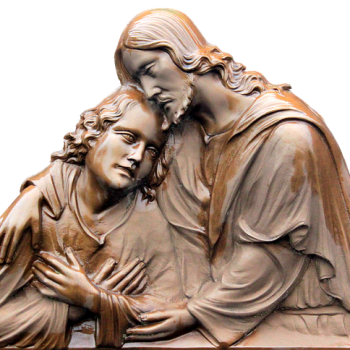Our mission as Catholics is to save souls by bringing them to Christ and his Church. That’s evangelization, but that word evokes images of foreign missionaries or retreat leaders.
In truth, each of us is called to be an evangelist. We can’t all be traveling orators, though, so how do we evangelize in daily life? Fortunately, one of the best ways to attract people to our faith is through good works.
My favorite passage in the Bible is from James 2:14-18:

“My brothers, what good is it to profess faith without practicing it? Such faith has no power to save one, has it? If a brother or sister has nothing to wear and no food for the day, and you say to them “Good-bye and good luck! Keep warm and well fed,” but you do not meet their bodily needs, what good is that?
“So it is with the faith that does nothing in practice. It is thoroughly lifeless. To such a person one might say, ‘You have faith and I have works—is that it?’ Show me your faith without works, and I will show you the faith that underlies my works!”
Setting an Example
St. Teresa of Calcutta certainly lived her faith according to the advice of St. James. When she approached the sick and dying in the streets, she did not just preach to them, or preach to them first and then aid them, she immediately gave them what they needed physically, which in itself helps to restore the soul.
St. Teresa knew that we lead by example — she never asked her sisters, the Missionaries of Charity, to do anything she had not done — and that we draw others to the Church by example.
A sharing of the faith can occur wordlessly in unison with loving care whether at a soup kitchen, a school, a hospital or wherever Catholic religious and laity perform good works in the name of the Church.

Tertullian wrote in his defense of Christians (Apologeticus, 197 AD), “See how these Christians love one another. See how they are ready to die for each other.” He had observed the examples of their faith in action and understood that they were part of being Christian.
What Those Catholics Do
The Catholic Church is the largest charitable organization in the world for a reason. Christ commanded us to love God and to love one another, so we show our love for God by loving one another.
Nonetheless, do we get so wrapped up in the ways to show love that we forget to share the reason that we love? Are there Catholic charities that appear to people to be no different from other social programs because they are provided in as secular a manner as those other programs?
In a recent blog, I discussed the problem of secularization within the Church —https://www.patheos.com/blogs/musingsfromthepew/2021/09/blogs-musingsfromthepew-p280/ — making the point that we, as Catholics, can provide social programs, but we cannot be a social program pretending to be a religion.
While our charities can be a way to introduce others to Catholicism, we should not be doing good works just to sell Catholicism. We are not Pharisees praying and giving alms to look holy and be praised for our piety. We are doing good works because, as Catholics, we love our neighbors as God commanded us to do.
What Faith Can Do

In the process, we are setting a good example of what faith can do. Like the early Christians, others should be able to look at us and say, “See how these Catholics love one another and all others as well.
Such an observation will likely lead to questions and a conversation about Catholicism. How many times have you heard converts say that they were drawn to the Church simply by noticing that their Catholic friends seemed to have something that was lacking in their own lives?
The expression “practicing Catholic” should not mean only that one is in regular attendance at Mass and receiving the sacraments. A “practicing Catholic” should also mean practicing the faith in word and deed, that is, sharing the faith proudly and doing good deeds.
For as St. James said, faith and good works go hand in hand. Like love and marriage or the horse and carriage of song, faith and good works go together. Faith is empty without good works; good works are meaningless without faith. You can’t have one without the other.
















